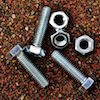
Spotlight on the Virtual QuarkNet Center
The Virtual QuarkNet Center was established in "the aughts" as an alternative center for teachers not near or connected to an established geographic QuarkNet center. The group meets online once per month and physically for a few days each summer at an agreed-upon location. The Virtuals are in some ways a band of pioneers; they established working together by videoconference before it was popular, and several of the teachers have run masterclasses on their own with remote support from a mentor and IMC central coordination. They are still active with cosmic ray detectors; this was the main focus of the Virtual Center when it began. The locations of the teachers range from Vermont to North Carolina to New York to Shanghai. The mentors had been from Notre Dame, but the torch recently passed to Danielle McDermott, a condensed matter physicist at Pacific University in Oregon who is married to "mentor emeritus" Dan Karmgard, still involved in the program.

News from QuarkNet Central
The big news from QuarkNet Central this week is so big that we will devote more space to it next week; our program spokesperson, Marge Bardeen, is retiring from Fermilab next week. Or, as the article from Fermilab puts it, Marge Bardeen, education and outreach pioneer, retires. Fear not, though, Marge will stay on with QuarkNet through the coming summer; more next Friday.
Applications for U.S. partiocipation in the CERN High School Teachers program are now closed. Thank you to the many who applied and to the thoughtful folks who wrote them recommendations. We have a lot of great applications and we hope to announce our "final five" in the first half of February.
Time is running short to arrange International Masterclasses, but you can still do it! Fermilab masterclass videoconferences begin in just over a month. Check to see if your QuarkNet center is on the schedule. Questions? Ready to jump on it? Contact Ken.
Speaking of which, International Masterclasses are on social media! You can read about it in the latest circular or check out the IMC Twitter page, @physicsIMC. And do not forget to have students in masterclasses tweet their experiences with #LHCIMC18.

QuarkNet Nuts and Bolts
Thank you very much to all who contributed QuarkNet Stories from the Classoom. It was wonderful to read about the many great things QuarkNetters and their students are doing. They are collected on a new page in our site, https://quarknet.org. Just go to the ABOUT button and find STORIES toward the bottom of the pop-down menu. It is not too late to add your story to the site. Just send the text to Ken. Photos welcome as well.

Physics Experiment Roundup
Fermilab and SLAC are getting into the free electron laser (FEL) business in a big way. Fermilab just completed a cryomodule to go in the first-ever X-ray FEL at SLAC. A lot is happening on the neutrino front as well. Fermilab is finshing construction of ProtoDUNE to test out technology for DUNE. Computation is advancing too, from White Rabbit, a new way to time neutrino events, to neural networks, as featured in symmetry, used to analyze the events. The roundup finishes with some cosmic ray studies history: the Soviet-era Byurakan Astrophysical Observatory in Armenia, described in New Scientist. One way cosmic ray efforts in Armenia and Georgia are reviving today is with use of our own QuarkNet DAQ.

Resources
Read and share this World Economic Forum article by CERN Director General Fabiola Gianotti, Science is universal and unifying. Check out a new video, What is relativity all about?, by Don Lincoln.

Just for Fun
See how a CMS data workshop went at the University of Colima in Mexico with this article and this video . . . and brush up on your Spanish at the same time! And, while we still cannot answer the missing antimatter question, at least we do find a hypothesis about missing leprechauns in xkcd.
QuarkNet Staff:
Mark Adams: adams@fnal.gov
Ken Cecire: kcecire@nd.edu
Deborah Roudebush: droudebush@cox.net
Jeremy Smith: jsmith10@bcps.org
Shane Wood: swood5@nd.edu